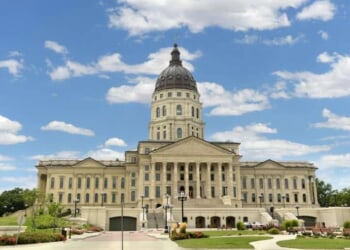During his first term, President Donald Trump distinguished himself as arguably the most pro-life president the U.S. had ever seen, from issuing “heartbeat” protections for unborn children to becoming the first president to speak at the March for Life to appointing the U.S. Supreme Court justices instrumental in overturning Roe v. Wade in 2022. However, since the Court’s landmark decision, Trump has retreated from his once-stalwart defense of the unborn. His more “moderate” approach has left many pro-life Americans feeling as though they — and millions of unborn children — no longer have a champion.
Months before his historic, landslide electoral victory last year, Trump publicly announced that he did not intend to advance pro-life policies or measures at the federal level. “The states will determine by vote or legislation — or perhaps both — and whatever they decide must be the law of the land,” he said in April of 2024, after denigrating the Republican Party’s longstanding commitment to pro-life principles in the wake of the 2022 midterm elections.
Trump has seemingly followed through on his campaign announcement, much to the dismay of many of his most loyal supporters. Although he has pardoned dozens of pro-life Americans targeted for prosecution by the Biden administration and promised to enforce the Hyde Amendment, effectively defunding abortion behemoth Planned Parenthood, the president has refused to endorse pro-life legislation at the federal level and has committed to expanding access to in vitro fertilization (IVF), which results in the deaths of far more unborn children than abortion does.
For those of us who have supported Trump, in no small part due to his pro-life record — and have endured years of being derided as racists, fascists, and Nazis for doing so — his capitulation on pro-life issues is more than disheartening.
There is, however, a strong case to be made for Trump reversing his position and once again standing as a champion of the unborn. First of all, the president is incorrect when he declares that overturning Roe relegated abortion to the status of a state-level issue. In his Supreme Court opinion, Justice Samuel Alito wrote, “It is time to heed the Constitution and return the issue of abortion to the people’s elected representatives.” At no point did the Court restrict abortion legislation to the states or bar the federal government from legislating on the issue. In fact, he wrote that the Court was returning “the power to weigh those arguments to the people and their elected representatives.”
There is nothing — at least not as far as the Supreme Court’s ruling is concerned — to prevent elected representatives at the federal level from issuing stringent pro-life legislation. Any argument to the contrary is disingenuous and erroneous. There are, of course, unfortunate political realities that some in Congress feel inhibit the possibility of authoring and passing protections for the unborn. But even these political realities are, to a large extent, malleable, particularly in Trump’s hands. The president has already demonstrated, on numerous occasions, the significant sway he holds over the Republican Party. Despite nearly a decade of the most aggressive propaganda campaign ever launched against a U.S. presidential candidate, he managed to return to the White House, winning not only the Electoral College but also the popular vote. Were he to launch a campaign to outlaw the slaughter of the unborn, he would more than likely find a way to succeed and still maintain better-than-average polling numbers.
The U.S. cannot be a patchwork of red states and blue states waging legal wars over abortion.
An effort to boldly and clearly confront and eradicate the evil of abortion is morally necessary. It is also, however, rapidly becoming constitutionally necessary. Recently, Louisiana and Texas, states that both have strong pro-life protections, have clashed with New York over abortion. Specifically, an abortionist in New York has mailed abortion pills to women in Louisiana and Texas, violating those states’ laws.
Louisiana Governor Jeff Landry, a Republican, filed to extradite the abortionist who sent abortion pills to a parish near Baton Rouge, while a Texas judge fined the abortionist in excess of $10,000. Empire State Governor Kathy Hochul, a Democrat, has rejected Louisiana’s extradition attempts and refused to comply with the fine from Texas. New York has “shield” laws in place, allowing abortionists in the state to violate pro-life laws in other states without fear of consequence.
He has before him an opportunity to avert what would likely become a calamitous national conflict.
The U.S. cannot be a patchwork of red states and blue states waging legal wars over abortion. When the courts cannot or will not resolve those conflicts, that war will inevitably take a more brutal shape. The U.S. Supreme Court has already declared, in clear and reasoned terms, that abortion cannot be decided by judicial fiat. Yet the issue is of profound moral gravity, even more so than the issue of slavery, which was one of the chief factors in tearing the U.S. apart in the bloody Civil War.
President Trump has declared himself a peacemaker and a champion for Americans, especially those who have been ignored, forgotten, silenced, and maligned by their government over the years. He has before him an opportunity to avert what would likely become a calamitous national conflict and, at the same time, fight for those who have been the most ignored, forgotten, silenced, and maligned by their government: the millions of unborn innocents slaughtered by abortion.
Subscribe to The American Spectator to receive our spring 2025 print magazine.


![NYC Tourist Helicopter Falls into Hudson River, Siemens Executive and Family Among Those Killed [WATCH]](https://www.right2024.com/wp-content/uploads/2025/04/NYC-Tourist-Helicopter-Falls-into-Hudson-River-Siemens-Executive-and-350x250.jpg)





![Biden Drops Racial Slur During First Public Speech Since Leaving Office [WATCH]](https://www.right2024.com/wp-content/uploads/2025/04/Biden-Drops-Racial-Slur-During-First-Public-Speech-Since-Leaving-350x250.jpg)

![Red Sox Fan Makes the ‘Catch of the Day’ with Unconventional ‘Glove’ [WATCH]](https://www.right2024.com/wp-content/uploads/2025/04/Red-Sox-Fan-Makes-the-‘Catch-of-the-Day-with-350x250.jpg)





